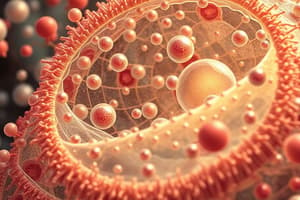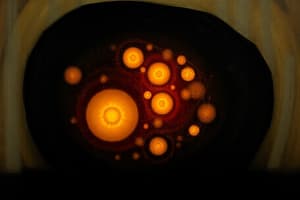Podcast
Questions and Answers
What is the primary function of ribosomes in a cell?
What is the primary function of ribosomes in a cell?
- Energy production
- Detoxification
- Lipid synthesis
- Protein production (correct)
The smooth endoplasmic reticulum is involved in protein synthesis.
The smooth endoplasmic reticulum is involved in protein synthesis.
False (B)
What distinguishes eukaryotic cells from prokaryotic cells?
What distinguishes eukaryotic cells from prokaryotic cells?
Eukaryotic cells have membrane-bound organelles, whereas prokaryotic cells do not.
The plasma membrane is composed of a bilayer of __________.
The plasma membrane is composed of a bilayer of __________.
Match the following components of the plasma membrane with their roles:
Match the following components of the plasma membrane with their roles:
What stage follows the entry of the virus into the host cell?
What stage follows the entry of the virus into the host cell?
Which of the following substances can the plasma membrane allow to enter the cell?
Which of the following substances can the plasma membrane allow to enter the cell?
The plasma membrane is impermeable to all substances.
The plasma membrane is impermeable to all substances.
Viruses can reproduce independently of a host cell.
Viruses can reproduce independently of a host cell.
What is the primary function of ribosomes in eukaryotic cells?
What is the primary function of ribosomes in eukaryotic cells?
What is the role of the rough endoplasmic reticulum?
What is the role of the rough endoplasmic reticulum?
The __________ virus is responsible for COVID-19.
The __________ virus is responsible for COVID-19.
Which organelle is involved in modifying and packaging proteins?
Which organelle is involved in modifying and packaging proteins?
Match the cellular components to their functions:
Match the cellular components to their functions:
What is the main structural difference between Gram-positive and Gram-negative bacteria?
What is the main structural difference between Gram-positive and Gram-negative bacteria?
What process describes the release of new viruses from a host cell?
What process describes the release of new viruses from a host cell?
What is the primary function of plasmid DNA in bacteria?
What is the primary function of plasmid DNA in bacteria?
Eukaryotic cells typically contain plasmid DNA.
Eukaryotic cells typically contain plasmid DNA.
What structure provides motility in bacterial cells?
What structure provides motility in bacterial cells?
Bacterial cells appear _____ after Gram staining if they are gram-positive.
Bacterial cells appear _____ after Gram staining if they are gram-positive.
Match the following features of bacterial cells with their descriptions:
Match the following features of bacterial cells with their descriptions:
Which type of bacteria would appear pink/red after Gram staining?
Which type of bacteria would appear pink/red after Gram staining?
Eukaryotic cells have a capsule for protection against dehydration and immune response.
Eukaryotic cells have a capsule for protection against dehydration and immune response.
What is the structure that functions as a lipid bilayer in bacterial cells?
What is the structure that functions as a lipid bilayer in bacterial cells?
What is the primary purpose of telophase during cell division?
What is the primary purpose of telophase during cell division?
Telophase marks the end of meiosis.
Telophase marks the end of meiosis.
What happens to the daughter chromosomes during telophase?
What happens to the daughter chromosomes during telophase?
The ______ ring contracts to facilitate cytokinesis.
The ______ ring contracts to facilitate cytokinesis.
What mechanism is involved in the reassembly of the nuclear envelope during telophase?
What mechanism is involved in the reassembly of the nuclear envelope during telophase?
What is an important consequence of proper chromosome separation during anaphase?
What is an important consequence of proper chromosome separation during anaphase?
Match the following key events of telophase with their descriptions:
Match the following key events of telophase with their descriptions:
The final step of cell division is known as ______.
The final step of cell division is known as ______.
Which of the following types of stem cells can differentiate into any cell type, including extra-embryonic tissues?
Which of the following types of stem cells can differentiate into any cell type, including extra-embryonic tissues?
Adult stem cells are typically considered totipotent or pluripotent.
Adult stem cells are typically considered totipotent or pluripotent.
What type of stem cells can only differentiate into one specific type of cell?
What type of stem cells can only differentiate into one specific type of cell?
The three primary germ layers are the endoderm, mesoderm, and __________.
The three primary germ layers are the endoderm, mesoderm, and __________.
Match the stem cell type with its description:
Match the stem cell type with its description:
What type of stem cells are hematopoietic stem cells considered?
What type of stem cells are hematopoietic stem cells considered?
Somatic cells have the potential to transform into other cell types.
Somatic cells have the potential to transform into other cell types.
Give an example of a unipotent stem cell.
Give an example of a unipotent stem cell.
Study Notes
Cellular Structures and Functions
- Ribosomes: Protein synthesis factories located free-floating in the cytoplasm or attached to rough endoplasmic reticulum (ER).
- Endoplasmic Reticulum (ER):
- Rough ER: Contains ribosomes; responsible for synthesizing proteins.
- Smooth ER: Lacks ribosomes; involved in lipid synthesis and detoxification.
- Eukaryotic Cell Components: Includes nucleus, plasma membrane, mitochondria, vesicles, Golgi body, lysosomes, peroxisomes, ribosomes, and both types of ER; differentiates eukaryotic from prokaryotic cells, which lack membrane-bound organelles.
Plasma Membrane
- Cell Membrane: Acts as a barrier, regulating substance entry and exit using a lipid bilayer structure.
- Lipid Bilayer: Composed of hydrophilic heads facing outward and hydrophobic tails inward, creating a semi-permeable barrier.
- Selectively Permeable: Maintains internal environment by controlling nutrient intake (e.g., oxygen, glucose) and waste expulsion.
- Membrane Proteins:
- Intrinsic Proteins: Span the membrane, facilitating transport.
- Extrinsic Proteins: Bound to one side, involved in signaling and structural support.
Bacterial Cell Features
- Plasmid DNA: Circular DNA in bacteria that may provide advantages like antibiotic resistance; absent in eukaryotes.
- Capsule: Protective outer layer in bacteria, composed of polysaccharides or proteins; eukaryotes have no capsule.
- Flagella: Motility structures; differ in structure and movement mechanism between bacteria (simple) and eukaryotes (complex).
- Gram Staining:
- Gram Positive: Thick peptidoglycan layer retaining crystal violet stain (purple).
- Gram Negative: Thin peptidoglycan layer with outer membrane, takes up counterstain (pink/red).
Difference Between Cell Types
- Prokaryotic Cells: Lack a nucleus, contain smaller ribosomes (70S), and have a cell wall with peptidoglycan.
- Eukaryotic Cells: Contain a nucleus with linear DNA, larger ribosomes (80S), and membrane-bound organelles.
Mitosis: Telophase
- Key Events:
- Chromosomes arrive at poles and decondense, returning to less visible chromatin form.
- Reformation of the nuclear envelope around separated chromosomes.
- Completion of mitosis, ensuring proper chromosome distribution.
- Formation of a contractile ring leading to cytokinesis.
Importance of Telophase
- Nuclear Reformation: Ensures each daughter cell has a complete nucleus.
- Cytokinesis Preparation: Prepares for the final division of the cytoplasm into two cells.
Cell Differentiation and Stem Cells
- Cell Differentiation: Process by which cells specialize to perform specific functions in multicellular organisms.
- Stem Cells Types:
- Totipotent: Can become any cell type including extra-embryonic tissues (e.g., zygote).
- Pluripotent: Can differentiate into any cell within the three primary germ layers but not into extra-embryonic tissues (e.g., embryonic stem cells).
- Multipotent: Limited differentiation capabilities within specific tissues (e.g., hematopoietic stem cells).
- Oligopotent: Differentiate into a few closely related cell types (e.g., lymphoid stem cells).
- Unipotent: Can only become one specific type of cell (e.g., skin stem cells).
Conclusion on Cellular Biology
- Understanding cell structures and functions aids in recognizing the differences between eukaryotes and prokaryotes, as well as the processes of mitosis and cell differentiation, which are vital for tissue development and function.
Studying That Suits You
Use AI to generate personalized quizzes and flashcards to suit your learning preferences.
Description
Test your knowledge on ribosomes and the endoplasmic reticulum in eukaryotic cells. This quiz covers the structure, function, and distinction between rough and smooth ER. A labelled diagram is included to enhance your understanding.



